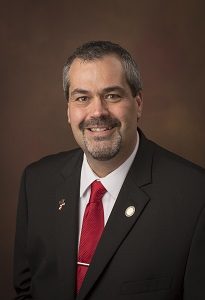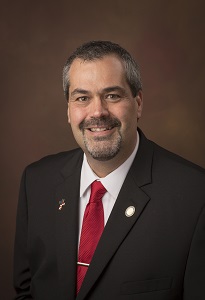CONSTITUTIONAL AMENDMENT TO PROTECT LIFE
The Value Them Both Amendment to the Constitution was introduced in both the House and Senate on Thursday, January 16th. Both SCR 1613 and HCR 5019 have been passed out of their respective committees as of January 22nd, Fed and State Affairs in the House and Judiciary in the Senate. Floor debate is set to begin in earnest next week, with both the Senate and House seeking to pass the measure quickly.
Senate testimony in support of the amendment underlined the importance of rolling back a supposed right to abortion and its accompanying strict scrutiny requirement in order to protect reasonable regulation of the abortion industry, especially laws protecting parental consent, clinical cleanliness and licensing standards as well as informed consent for every patient.
Opponents of the amendment essentially argued this amendment was a prelude to a full ban, seeking to incite public outcry because the Amendment does not allow Kansas to over-rule federal law.
Passage of this amendment through the Senate will reinstate the right role of the Legislature to regulate this industry like any other. The Value Them Both Amendment seeks to protect both mother and child and it takes the question of who should represent them back to the people.
RALLY FOR LIFE
This year’s annual Rally for Life came at a perfect time to promote the proposed Value Them Both Constitutional Amendment. The rally has taken place every year since the Roe v. Wade Supreme Court decision was made 47 years ago on January 22nd, which granted women the right to an abortion. On Wednesday, pro-life groups made their voices heard in opposition.
It brings together pro-life Kansas lawmakers and groups from across the state to discuss what they can do to impact the current laws on abortion. Representatives Susan Humphries and Susan Concannon took to the podium along with Senate President Susan Wagle who said, “We’re here to protect life at the beginning of life, at the end of life, when life is vulnerable, when a person is disabled. We go out of our way to care for others because they are created in the image of God.”
Jeanne Gawden, from Kansans for Life, read breaking news from President Trump who declared January 22nd ‘National Sanctity of Human Life Day.’
MEDICAID EXPANSION
The Public Health and Welfare Committee began hearing testimony on SB 252. Those in favor of expanding Medicaid argued the bill should pass, as is, without work requirements or conscientious objections provisions. Under the Denning-Kelly plan, Kansans in the coverage gap ages 19-64 who earn up to 138% of the federal poverty level would be eligible for Medicaid, which is now only available to the elderly, children, and those who are disabled and don’t have the option to work.
In his testimony in favor of SB 252, Senate Majority Leader Jim Denning explained the Pathway to Work provision that was also a provision in the draft rs1873 bill presented in the Senate Select Committee on Healthcare Access. The federal Affordable Care Act (ACA) law prohibits any work requirement provisions that can impact enrollment up to 138% of the federal poverty level. That means it is illegal to modify enrollment to exclude any Kansan between the ages of 19-64 with income up to 138% of FPL when expanding Medicaid. It is known that many states are proposing a work requirement, however, right now there is not a single state that has a functioning work requirement for Medicaid eligibility. Either the work requirement has been denied by CMS, struck down by the courts, and/or has been deemed too expensive by states to implement. This is why the Senate Select Committee proposed and believed a pathway to employment was the best approach at this time over a hard count work requirement.
Senator Gene Suellentrop chairs the committee which also heard from the Kansas budget director, Larry Campbell, who testified that the new estimated costs of expansion would be $40.32 million in the first full year of implementation and $37.1 million in the second year. That includes a $35 million cost each year for a newly proposed “reinsurance” program which would subsidize rates in the private health insurance marketplace and add an estimated 120 new employees to The Kansas Department of Health and Environment.
Senator Molly Baumgardner questioned the Kansas Hospital Association’s CEO, Tom Bell, about the finances of struggling hospitals which, expansion supporters say, need the influx of state and federal dollars to survive. Baumgardner asked Bell how expansion can help hospitals which only treat one or two patients per day. While Bell admitted he never promised Medicaid expansion alone would save rural hospitals, Senator Baumgardner reminded the group that claim has been a large part of the pro-expansion conversation and was a well-publicized element of Laura Kelly’s gubernatorial campaign.
Testimony continues next week. Chairman Suellentrop said he didn’t know when the committee will take action on the bill but that it will not happen next week.
2019 REPORT ON RURAL PROSPERITY
Lt. Gov. Lynn Rogers gave a report to the Senate Committee on Agriculture and Natural Resources on the findings of his Rural Prosperity Listening Tour this week. The tour took the Lt. Governor to 44 towns in 23 counties, where he spoke with Kansans at 16 manufacturers, 12 farms and agricultural facilities, 9 hospitals or healthcare facilities and more than 130 other meetings and events.
Lt. Governor Rogers reported that the newly created Office of Rural Prosperity will begin focusing on three primary areas of improvement based on the findings during the Listening Tour: Housing, Childcare, and Workforce Recruitment, Retention and Education. Other priorities identified by Kansans include removing roadblocks to prosperity such as lack of quality roads and bridges, state rules and regulations, lack of quality, affordable broadband and taxes in general (particularly property taxes).
INDUSTRIAL HEMP REPORT
Jeff Vogel, Kansas Department of Agriculture, briefed the Senate Committee on Agriculture and Natural Resources on the progress being made by farmers and growers in the state who have decided to produce industrial hemp. These growers are allowed to do so through the passage of Senate Substitute for HB2167 during the 2019 legislative session.
Vogel reports that the first year of the industrial hemp program’s research phase was a positive one overall, with 190 active growers in the state, 20 active distributors, 35 active processors, and 9 universities participating in the program. Vogel expects the KDA to have the state’s commercial program rules and regulations prepared for submission to the U.S. Department of Agriculture as early as next week.
Once the rules and regulations are approved by the USDA, the state will begin accepting licensure applications for a commercial industrial hemp program, which means growers could begin planting industrial hemp as early as the 2020 growing season. However, Vogel cautioned that the USDA approval process can often be slow and cumbersome, so growers should not get their hopes up in terms of being able to participate in a commercial program this growing season.
2020 PASSENGER RAIL MEETING
Senator McGinn hosted a packed meeting Wednesday regarding Kansas’s need to invest in passenger rail. The meeting included Kansas legislators, out-of-state officials with interest in rail, an Amtrak official and a Kansas Department of Transportation official.
This is the third meeting Senator McGinn has hosted, and the meetings seem to grow every year. Senator McGinn explained, “People nowadays want to be working on their computers. They want to be doing their business while they’re traveling, so this gives them an opportunity to do that.”
One proposal suggested bringing a passenger rail station to Wichita. Currently, the closest passenger rail station is in Newton. Officials hope to connect two of the Midwest’s largest cities, Wichita and Oklahoma City, by building a new station in Wichita.
When KDOT releases its next ten-year transportation plan, supporters are hoping passenger rail gets a greater focus than in years past.
AT RISK FUNDING REPORT
This week the Senate Education committee heard from Legislative Post Audit regarding the use of at-risk student funding. This hearing drew attention to the fact that the vast majority of “at-risk” funding was used to pay teacher salaries, not on targeted programs that address needs of at-risk populations above and beyond regular classroom learning. It also became apparent that school districts had a somewhat uncritical approach to evaluating the legal requirement that this special funding be funneled into “evidence-based” approaches.
As the Legislature has now met court-mandated levels of funding, the assurances set in place for the effective use of these at-risk funds seems to have failed in their intended purpose. The Education committee plans to continue digging deeper into these new findings.


